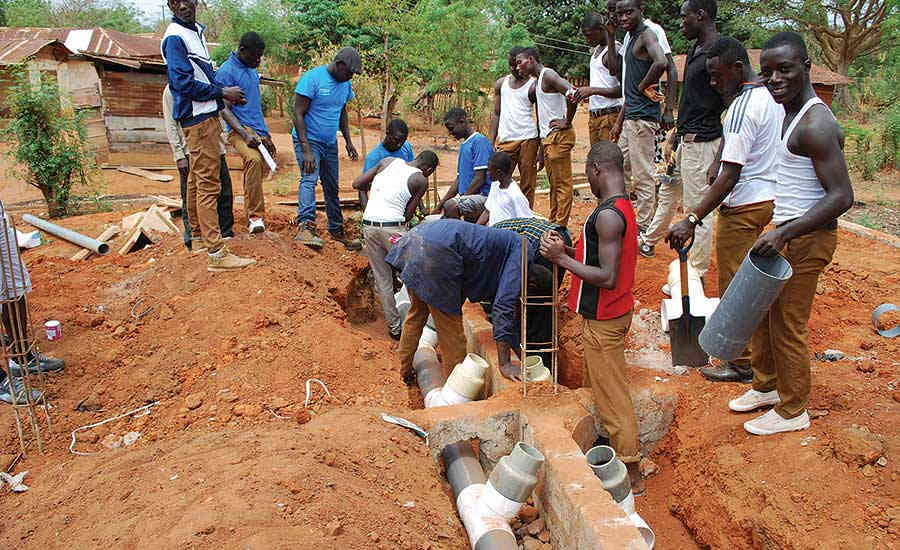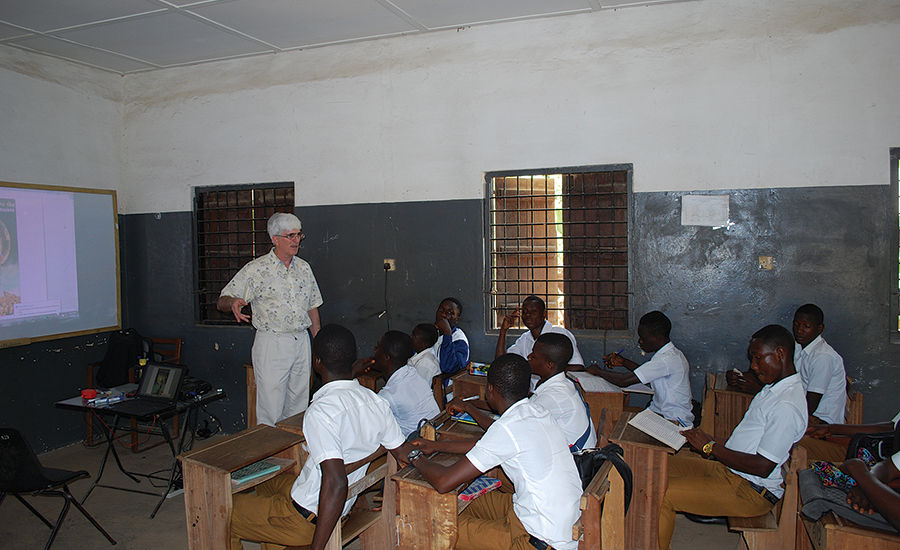Training to be a plumber in Ghana

In the Kwahu South region of Ghana, the plumbing training is conducted at the local vocational school. Photo credit: Julius Ballanco

Knowing that they had the responsibility to protect the clean water instilled a sense of pride in the students. Photo credit: Julius Ballanco


In the Kwahu South region of Ghana, the plumbing training is conducted at the local vocational school. The best way to describe this region of Ghana is that it would resemble West Virginia in the 1920s. It is high country with many winding dirt and partially paved roads. The main roads are paved.
While there is indoor plumbing in the area, only about 10% of the people have it. In order to assist the villages with indoor plumbing, there has been a concerted effort to building toilet-room buildings in each village. In addition, wells are dug or drilled in many parts of the country. Many of the wells are sponsored by various organizations that promote the installation of wells in Africa.
The plumbing program in the vocational school is a four-year program. The students can enter the program after they finish their secondary (high school) education. The program includes both classroom and practical applications.
Our Ghanaian hosts had arranged for me to visit the vocational school and assist the school in opening a satellite campus in a remote village. However, when I arrived at the school, no one from the plumbing program was present. Furthermore, no one at the school knew I was coming. As a result, it was difficult trying to ascertain where the plumbing instructors and students disappeared to.
After some explanation, the school finally let us know that the plumbing instructors and students were at a remote village getting some experience with an actual plumbing installation. My host, driver and I were allowed to visit the class as long as we took a security person from the school with us. The taxi had room for four, so we headed to the installation.
The plumbing instructor greeted me and immediately apologized for having the dates of my visit mixed up. I watched as all of his students worked very hard doing the underground rough-in for a new toilet room building in the village.
As the students continued hard at work, the instructor took me down the hill to show me the two new wells that were already installed by the students. The wells were 150 meters deep, which translates to almost 500 feet. One well had a hand pump with the women and children hard at work filling their water containers to carry on their heads to their homes.
The other well was temporarily capped until the work was further along for the toilet room building. The well water would be pumped to the toilet room building to flush the water closets and urinals. The well would also supply water to the lavatories.
The students were following the plans for the building, which had two sides — the men’s side and the women’s side. The women’s side had water closets and lavatories. The men’s side had water closets, urinals and lavatories. Immediately outside the building was a septic tank.
One of the first things you noticed was that all of the underground work and the septic tank hole were all dug by hand. There were no backhoes or power tools of any type. The students were the manual labor for digging and installing the pipe. The septic tank would be built in place with concrete block. Preformed tanks are not an option in the region.
As I was looking for the field for the septic tank, I was informed that the liquid run off would be piped to the ditch. All storm and sanitary overflow from septic tanks discharged into a combined ditch on the side of the road. These ditches sometimes went through open areas or fields. This particular ditch eventually ran right past the newly installed wells.
When the students returned to the classroom in the following days, I was given the opportunity to instruct them on plumbing in the U.S. I also taught some classes to first-year students on the basics of plumbing.
The International Association of Plumbing and Mechanical Officials (IAPMO) and the American Society of Plumbing Engineers (ASPE) were kind enough to donate educational material and code books to the plumbing vocational program. I also presented the school with a number of electronic training programs on plumbing. The head instructor was grateful to receive all of the information provided on plumbing systems, design and installations.
Through the use of computer technology, I modified a famous U.S. poster and converted it to read “The Plumber Protects the Health of the Ghanaians.” The students had never heard of this expression.
For many of them, drinking clean water came out of a bag. Vendors sell half liter plastic bags of water that are certified safe to drink. You bite off the corner of the bag and either suck or squeeze the water out of the bag. Knowing that they had the responsibility to protect the clean water instilled a sense of pride in the students.
In the practical training area of the school, there were many donated tools and devices. You would guess that many of the tools date back to the 1950s. Some are that old, others are newer, but all the tools were hand tools. There were no power tools, which seemed bizarre. You would expect to see at least a few wired or possibly battery-operated tools.
I thought about the power tools that we throw out because no one wants old tools. I have personally thrown out a number of battery tools only because I upgraded to newer models. I couldn’t unload the old tools because everyone wanted something that was new.
Well, the Ghana plumbing school in the Kwahu South region can use whatever old power or battery operated tools that you want to unload.
When I shadowed a plumber that graduated from the vocational school and was now licensed, I experienced life without modern tools. At one job site, his employee was chiseling a groove in the concrete wall to install the water piping for a well system. I thought of how fast it would have gone with a simple power tool. Instead, he took a few hours to get a nice groove to fit the pipe. After the pipe was installed, they grouted it in place. It was definitely a different way of installing plumbing.
I can only give you a quick overview of life in this region of Ghana. After my visit, I truly appreciate what a great country we live in. At the same time, I can’t wait to return to Ghana to work with the people again. My next trip will be this coming February. In the meantime, we are collecting supplies that we can bring to the region.
If you are ever presented with the opportunity to participate in a mission of this sort, I would encourage you to seriously consider it. The experience will be life-changing.
Looking for a reprint of this article?
From high-res PDFs to custom plaques, order your copy today!








